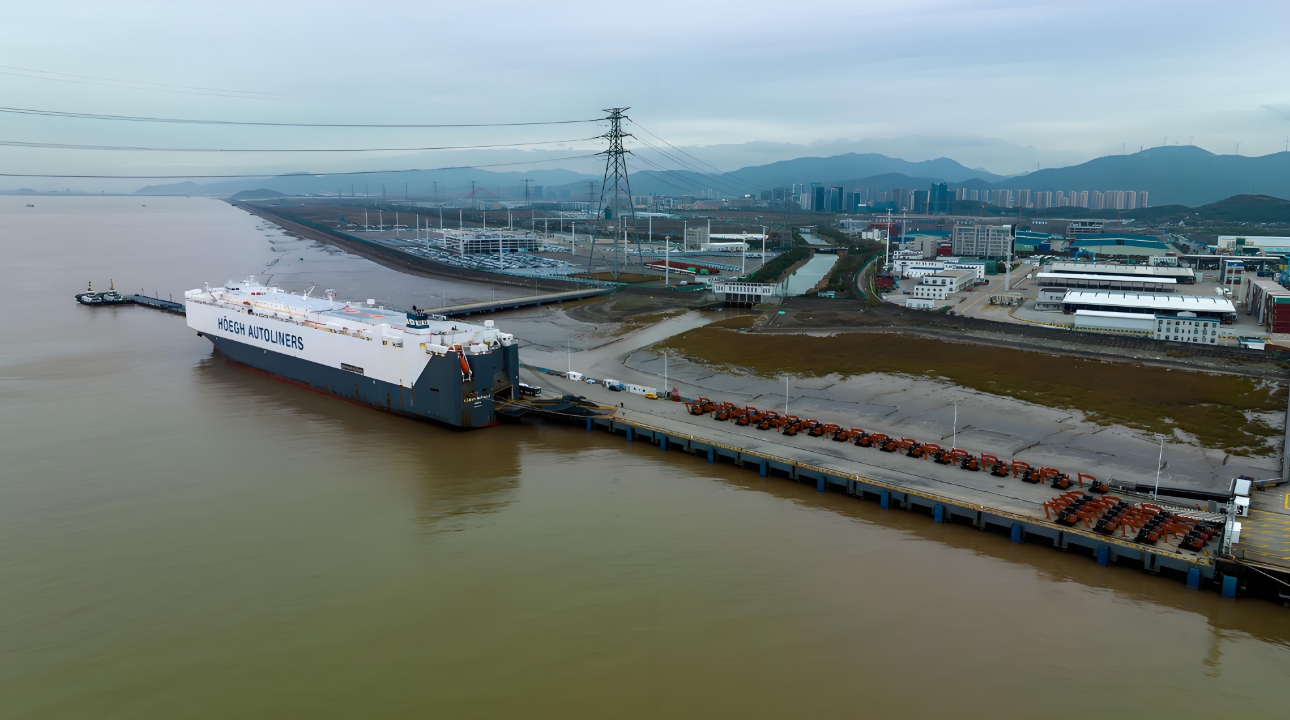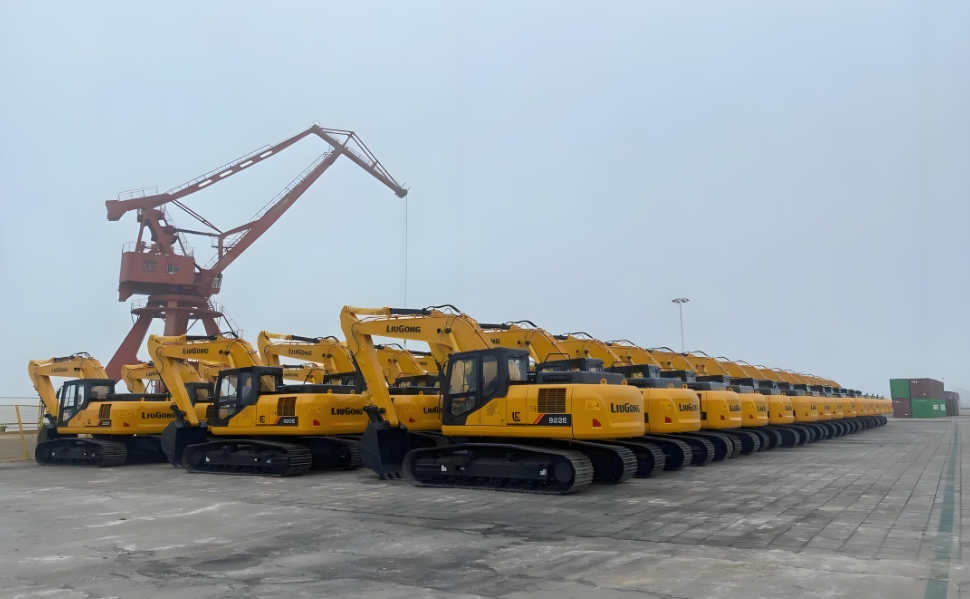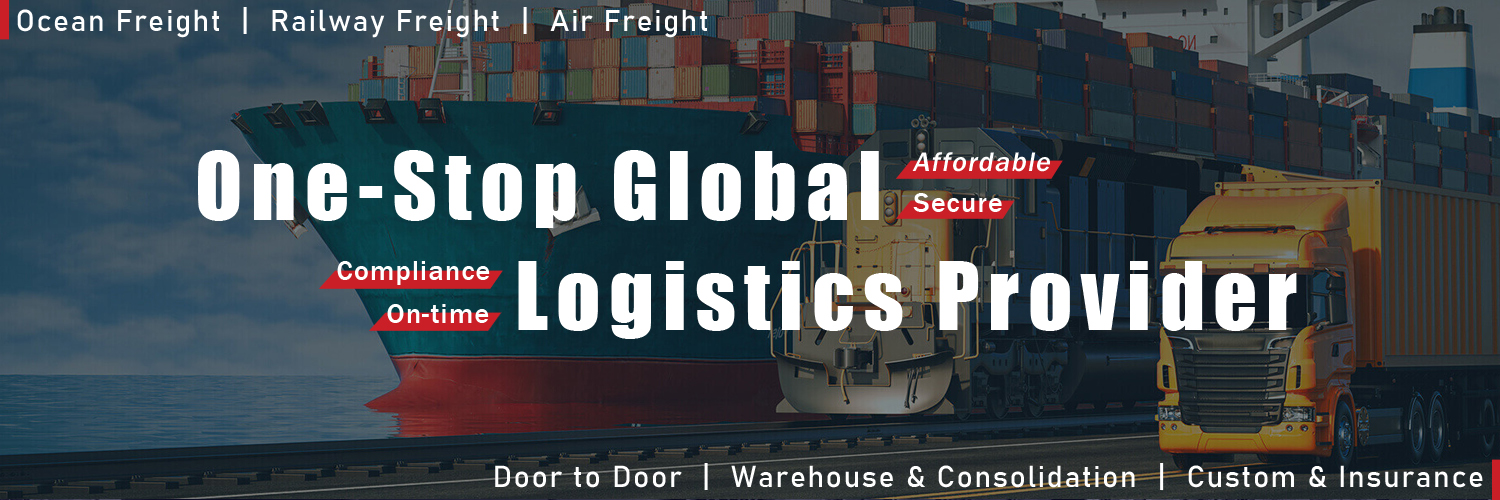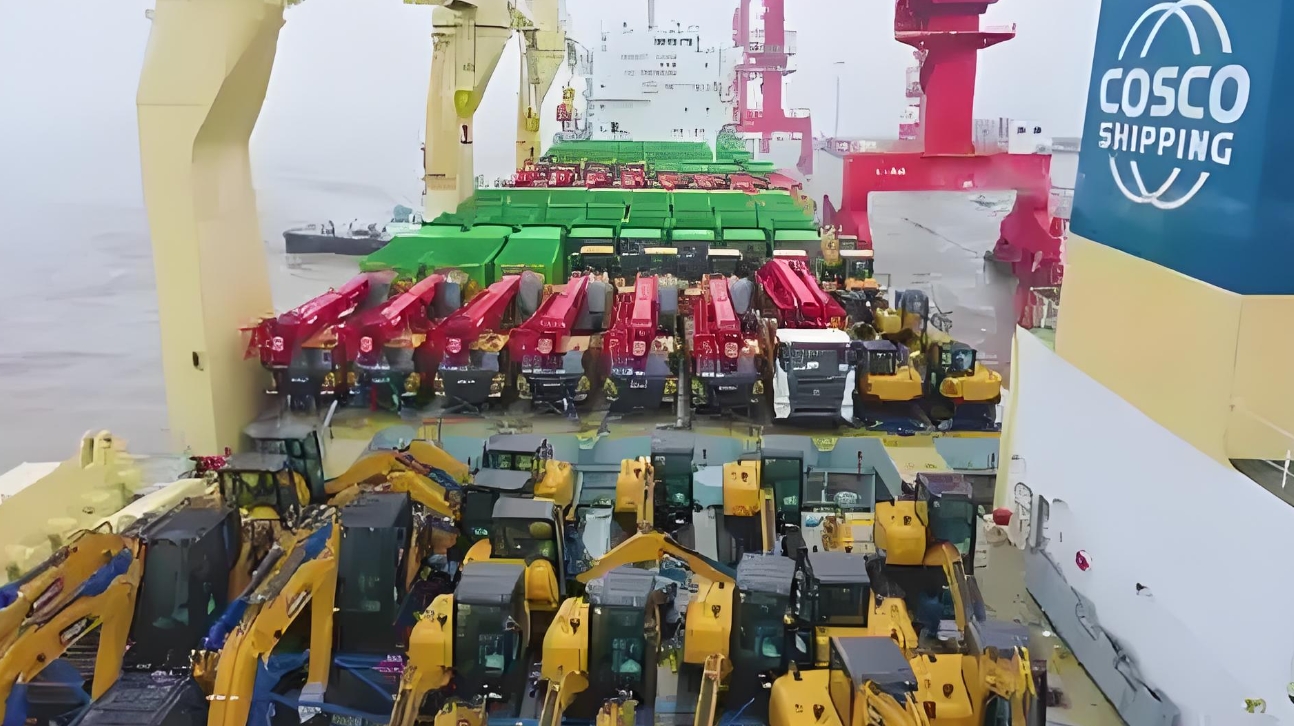How to purchase excavators from China and transport them out
Expanding business or launching new projects often comes with difficult decisions, and purchasing excavators may be one of them. You may have heard that China is the preferred destination for cost-effective and high-quality machinery. But how do you ensure the best deal without compromising quality or reliability?
Purchasing from China is not just about saving money. This is about confidently and clearly navigating a complex process. From understanding what you need, to building relationships with suppliers and managing logistics, this guide will provide you with practical and actionable steps to purchase excavators like a professional and ultimately how to transport them to your country with the least amount of money. Let's uncover the mystery of this process and help you avoid common pitfalls along the way.
Why Choose China for Excavators?
A Global Hub for Construction Machinery
China has cemented its position as a world leader in construction equipment manufacturing, thanks to decades of innovation, infrastructure development, and massive production capacity. Today, the country produces excavators that are exported globally to meet the needs of small businesses, contractors, and industrial enterprises alike.
Fact: Over 40% of the world’s construction machinery is manufactured in China, with excavators being one of the most sought-after products.
Competitive Pricing Without Sacrificing Quality
Maximizing cost efficiency is the primary benefit of sourcing from China. Manufacturers in China leverage economies of scale, optimized supply chains, and a proficient labor force, which significantly reduces production expenses and results in competitive pricing for international buyers. Despite the lower costs, numerous Chinese producers hold certifications for global quality benchmarks like CE, ISO, and EPA, guaranteeing that their goods meet the stringent requirements of worldwide markets.
A Wide Range of Options for Every Business
Chinese suppliers cater to diverse needs with an extensive product range:
- Compact excavators ideal for tight urban spaces or landscaping.
- Heavy-duty models built for large-scale construction or industrial applications.
- Hybrid and electric options for environmentally conscious buyers.
No matter the size or scale of your project, you’ll find models that fit your requirements and budget.
Continuous Innovation and Global Standards
Chinese manufacturers are no longer just imitators—they’ve become innovators. Companies now integrate advanced features such as:
- Fuel-efficient engines that reduce operational costs.
- Noise-reduction technologies for urban and residential use.
- Intuitive controls that improve operator comfort and productivity.
These advancements position China as a trusted supplier of high-performing machinery on the global stage.
Understanding Your Needs
Identifying the Right Excavator for Your Project
Ask yourself:
- What will the excavator be used for?
- Landscaping? Opt for compact models with maneuverability.
- Heavy-duty construction? You’ll need a model with higher horsepower and reach.
- What type of terrain will it operate on?
- Flat and firm? Rubber tracks are lightweight and gentler on surfaces.
- Rocky or muddy? Steel tracks provide better durability and grip.
- What’s your operational budget?
- Include costs for maintenance, spare parts, and fuel consumption when evaluating options.
Long-Term Considerations for Your Investment
Think beyond the initial purchase. A excavator is a long-term asset, and your decision should reflect its full lifecycle.
- After-Sales Support: Ensure the supplier offers spare parts and technical support.
- Resale Value: Machines from reputable manufacturers tend to hold their value better.
- Adaptability: Can the excavator handle multiple attachments for versatile use?
For instance, a landscaper might prioritize compatibility with digging buckets, augers, and grapples, while a construction company may focus on power and reach.
Where to Look for Reliable Manufacturers
Regional Specialties in China’s Manufacturing Landscape
China’s manufacturing industry is vast, but not all regions are equal when it comes to excavators. Knowing where to look can help you find specialized suppliers who meet your needs.
Shandong Province
Shandong is home to many cost-effective manufacturers catering to budget-conscious buyers. While prices are competitive, many suppliers here also prioritize basic quality standards.
Guangdong Province
Known for higher-end machinery, Guangdong manufacturers often offer advanced models with premium features. These suppliers are ideal if you’re looking for quality and innovation over price.
Zhejiang Province
Zhejiang specializes in compact and mid-range excavators with modern designs and cutting-edge technology, making it a hub for buyers seeking value-driven innovation.
Leveraging Trade Fairs for Supplier Discovery
Trade fairs in China offer unparalleled opportunities to meet manufacturers face-to-face, inspect products, and compare options.
- Canton Fair: A comprehensive event featuring a wide range of industries, including construction machinery.
- Bauma China: A construction-specific trade fair showcasing the latest in machinery and technology.
These events provide not only access to products but also an opportunity to build relationships with suppliers—an essential aspect of doing business in China.
Tip: If you can’t attend in person, many fairs now offer virtual options to connect with suppliers through online platforms.
Building Relationships with Suppliers
The Importance of Trust and Communication
In the realm of Chinese commerce, the concept of guanxi establishing trust based relationships is paramount. Although price and product quality are crucial factors, the success of your sourcing endeavors can be greatly influenced by your capacity to forge and sustain strong ties with your suppliers.
When trust is present, it paves the way for more favorable business transactions: Suppliers tend to extend more accommodating payment terms, quicker communication, and additional assistance when they have a trusted buyer relationship.
Practical Steps to Build Strong Relationships
- Communicate Clearly and Regularly
- Use straightforward language to avoid misinterpretation.
- Keep communication consistent, even after placing an order.
- Show Respect During Negotiations
- Avoid pushing too hard for steep discounts.
- Focus on creating a mutually beneficial agreement.
- Visit the Factory (If Possible)
- Nothing builds trust like an in-person visit.
- A factory visit allows you to inspect operations, meet the team, and clarify expectations directly.
Cultural Dos and Don’ts
- Do: Take time to understand cultural nuances. For instance, showing patience during negotiations is valued.
- Don’t: Skip small gestures of courtesy, like acknowledging holidays or sending follow-up emails.
Imagine sitting in a supplier’s office in Ningbo, sharing tea while discussing your project. This moment isn’t just about hospitality—it’s about building a connection that ensures smooth collaboration.
Quality Matters: What to Check
Ensuring You Get a Reliable Excavator
One of the most critical aspects of sourcing from China is verifying the quality of the excavator. A product that looks perfect in photos or videos may not meet your expectations once it arrives. This is where due diligence becomes essential.
Common Pitfalls to Avoid
- Misaligned Expectations: Specifications may not match what’s stated in the contract.
- Low-Quality Materials: Some manufacturers might cut costs by using substandard components.
- Unclear Contracts: Without detailed agreements, disputes can arise over what was promised versus delivered.
A Step-by-Step Process for Quality Assurance
- Request Product Samples or Videos
- Before committing to a large order, ask for a sample or detailed video demonstrations. Ensure the sample reflects the final product’s specifications.
- Conduct Factory Audits
- If you can’t visit in person, hire a third-party inspection company to perform a factory audit. Key aspects to check include.
- Production capacity.
- Quality control processes.
- Certifications (CE, ISO, etc.).
- If you can’t visit in person, hire a third-party inspection company to perform a factory audit. Key aspects to check include.
- Pre-Shipment Inspections
- Arrange for a third-party inspection before the excavators are shipped. Inspectors will verify:
- Dimensions, weight, and load capacity.
- Engine performance and safety features.
- Packaging quality to prevent damage during transit.
- Arrange for a third-party inspection before the excavators are shipped. Inspectors will verify:
Cost of Inspections
Hiring a professional inspection service typically costs $200–$400 per day, a small investment compared to the potential loss from receiving defective equipment.
Pro Tip: Build a checklist tailored to your needs to ensure nothing is overlooked during inspections.
Pricing and Negotiation: Get the Best Deal
Understanding Pricing Dynamics in China
The price of a excavator is influenced by several factors, including:
- Understanding Cost Variations: The Impact of Steel and Engine Parts Price Swings on Raw Material Expenses
- Rising Tide in Labor Expenses: The Gradual Increase in Wages in China's Advanced Manufacturing Centers
- Freight Costs Unveiled: How Shipping and Logistics Influence the Ultimate Price of Goods
Understanding these dynamics will give you a stronger position during negotiations.
Practical Tips for Negotiating
- Leverage Competitive Quotes
- Obtain quotes from multiple suppliers and use them as leverage to negotiate better terms. However, avoid presenting unreasonably low offers, as this may offend suppliers.
- Discuss Bulk Discounts
- Suppliers are often willing to offer lower prices for larger orders or repeated purchases. Discuss options for:
- Volume-based discounts.
- Combining orders to reduce unit costs.
- Suppliers are often willing to offer lower prices for larger orders or repeated purchases. Discuss options for:
- Clarify Payment Terms
- Negotiate payment terms that minimize risk, such as:
- 30/70 Split: Pay 30% upfront and 70% upon shipping.
- Escrow services to protect both parties.
Perspective on Value vs. Cost
“Remember, the cheapest option isn’t always the best. Prioritize value—a reliable machine with robust after-sales support will save you more in the long run than a low-cost product with high failure rates.”
Logistics and Shipping: Door to Door Shipping
Mastering the Logistics of Importing Excavators: From the factory to your doorstep
Shipping heavy machinery like excavators requires careful planning to avoid delays, unexpected costs, and damage. Understanding the logistics process will help you streamline your supply chain.
Breakdown of the Logistics Process
- Incoterms Explained
- These are international terms that define buyer and seller responsibilities. Key terms to know:
- FOB (Free on Board): The seller delivers the goods to the port, and you handle shipping.
- CIF (Cost, Insurance, Freight): The seller includes shipping and insurance in the price.
- DDP (Delivered Duty Paid): The seller handles everything, including customs and delivery to your location.
- These are international terms that define buyer and seller responsibilities. Key terms to know:
- Choosing Between Sea Freight and Air Freight
- Sea Freight: Cost-effective for heavy and bulky machinery but slower (typically 30–60 days).
- Air Freight: Faster (5–10 days) but significantly more expensive, often 5–10 times the cost of sea freight.
- Customs Clearance
- Be prepared with:
- Import licenses (if required in your country).
- Necessary certifications (CE, EPA).
- Accurate HS codes to classify the product for duties and taxes.
- Be prepared with:
Realistic Timelines and Potential Delays
Here’s a typical timeline for sea freight:
| Step | Timeframe |
|---|---|
| Manufacturing and QC | 15–30 days |
| Shipping to Port | 3–7 days |
| Sea Freight | 20–45 days |
| Customs Clearance and Delivery | 5–10 days |
Delays can occur due to:
- Port congestion.
- Documentation errors.
- Seasonal surges in shipping demand.
Pro Tip: Work with a freight forwarder to handle logistics and ensure a smoother process.
Navigating Regulations and Compliance
Avoiding Legal and Regulatory Headaches
Beyond the Supplier: Navigating the Complexities of Importing Excavators from China and Ensuring Compliance with Regulatory Standards
Understand the global transportation guidelines:
Shipping from China to UAE | Sea & Air Freight Rates
Shipping From China To USA | Transportation Through Various Channels
Shipping from China to Pakistan | Sea, Air & Rail Freight Rates
Logistics shipping prices from China to Saudi Arabia
Shipping from China to Oman| Price and Time
Certification Requirements for Excavators
Most countries have strict safety and environmental standards for construction machinery. Ensure that your supplier provides the necessary certifications, such as:
- CE Marking: Required in the European Union to certify compliance with health, safety, and environmental regulations.
- EPA Certification: Essential for meeting U.S. emissions standards.
- ISO Certification: A sign of consistent quality and reliability.
When discussing certifications with suppliers, request clear and complete documentation, including serial numbers and test reports.
Environmental and Safety Compliance
Excavators must adhere to environmental laws, especially in regions like the EU and U.S. that have stringent emissions standards. Check for:
- Low emissions engines (Tier 3 or Tier 4 standards in the U.S.).
- Noise-reduction technology, especially if the equipment will operate in residential or urban areas.
Failing to meet these standards can result in penalties, denied entry at customs, or difficulty reselling the equipment.
Managing Customs and Import Duties
Customs regulations vary by country, but the following are essential steps:
- Classify the Excavator with the Correct HS Code
- Use the Harmonized System (HS) code for excavators to determine applicable tariffs.
- A common code for mini excavators is 8429.52.
- Calculate Import Duties and Taxes
- Contact your country’s customs authority or use an online duty calculator.
- Include VAT, sales taxes, and any additional levies in your budget.
- Prepare Accurate Documentation
- Ensure all documents are in order, including:
- Bill of lading.
- Commercial invoice.
- Packing list.
- Certificates of origin (if required).
- Ensure all documents are in order, including:
Working with a customs broker can simplify the process and help avoid costly mistakes.
Case Study: How Presou Logistics Helped a Client Source an Excavator from China
When a client from Europe reached out to Presou Logistics to source an excavator, they needed more than just a machine—they needed guidance, trust, and a seamless process. Here’s how we made it happen.
Understanding the Client’s Needs
Embarking on a Heavy Machinery Purchase: Assisting a Novice Client in Selecting a Compact Excavator for Urban Landscaping Compliance. We Attentively Gathered Requirements on Operating Scenarios, Desired Engine Manufacturers, and Regulatory Standards. Without Complete Technical Specifications, We Compiled Catalogs, Narrowed Down to Three Top Contenders, and Advised on the Best Fit for Their Project and European Regulations.
Finding the Right Supplier
Tailoring to Client Preferences: Engaging with Reliable Suppliers to Secure an Optimal Excavator Deal. A Standout Supplier Offered Competitive Pricing, Attractive Payment Terms – 30% Advance and 70% on Delivery, a 12-Month Extended Warranty, and Rush Production to Fit the Schedule. We Facilitated the Decision Process by Providing the Client with Photos, Videos, and Comprehensive Technical Details.
Securing the Order and Monitoring Production
Once the client confirmed their choice, we issued a deposit invoice. Upon receipt of payment, we promptly forwarded it to the supplier and monitored production closely. Regular updates, including progress photos, kept the client in the loop and reassured them that everything was on track.
Ensuring Quality with Inspection
Given the technical nature of the excavator, we recommended a pre-shipment inspection. Our third-party inspectors reviewed the machine, checking engine performance and emission compliance, structural integrity and functionality, and packaging to ensure safe transport. The client received a detailed report, complete with photos and videos. Minor adjustments were made on-site to ensure the machine met the client’s expectations.
Shipping and Delivery
Once the excavator passed inspection, we coordinated sea freight. The machine was partially disassembled to fit into the container and packed securely in wooden crates to prevent damage. We provided real-time updates during transit, ensuring the client always knew the status of their shipment.
After-Sales Support
When the excavator arrived, we assisted the client with initial checks and setup. With guidance from the supplier, they successfully reassembled the machine and started operations. When a minor hydraulic issue arose, we acted quickly, coordinating with the supplier to ship a replacement part within 48 hours.
The Outcome
In just two months, the client received a high-quality excavator that perfectly suited their needs, saving 30% compared to local suppliers. With our support, they avoided common pitfalls and gained the confidence to navigate future projects. This is how Presou Logistics turns a daunting process into a success story. Ready to create your own? Let us guide you every step of the way.
Common Challenges and How to Overcome Them
Communication Barriers
Miscommunication is one of the most common challenges when sourcing from China. Differences in language, time zones, and business practices can lead to misunderstandings.
Solution:
- Use clear and simple English in all communication.
- Confirm important details in writing, including specifications, timelines, and payment terms.
- Consider hiring a sourcing agent fluent in Mandarin to bridge the gap.
Trust Issues with New Suppliers
It’s natural to feel wary about working with an unfamiliar supplier, especially for high-value purchases like excavators.
Solution:
- Check the supplier’s reputation through platforms like Alibaba and Global Sources.
- Request references from other international buyers.
- Start with a small trial order before committing to a larger purchase.
Hidden Costs
Unexpected expenses can quickly erode the cost savings of sourcing from China. Common hidden costs include:
- High freight charges due to miscalculated weights or dimensions.
- Customs duties or taxes you weren’t prepared for.
- Repair costs for defective or damaged goods.
Solution:
- Get detailed cost breakdowns from suppliers and freight forwarders.
- Build a contingency budget of 10–20% to cover unforeseen expenses.
Should You Use a Sourcing Agent? Here’s What You Need to Know
Streamlining the Excavator Import Process from China: How a Sourcing Agent Can Be Your Key to Navigating Market, Regulatory, and Logistic Challenges.
The Benefits of Using a Sourcing Agent
- Expert Knowledge: Sourcing agents understand the local market, supplier networks, and cultural nuances. They can identify reputable manufacturers and negotiate favorable terms on your behalf.
- Time Savings: Instead of spending hours comparing suppliers and managing communications, a sourcing agent streamlines the process, saving you time and effort.
- Quality Assurance: Many agents offer inspection services, ensuring the product meets your specifications before it’s shipped.
- Problem Solvers: From handling disputes to managing unforeseen issues, a good sourcing agent provides valuable support at every stage.
When a Sourcing Agent is Invaluable
- First-Time Buyers: If you’re new to importing, an agent can guide you through the entire process, from selecting suppliers to navigating customs.
- Complex Orders: For custom or large-scale orders, sourcing agents ensure accuracy in specifications and manage production monitoring.
- Language Barriers: If communication with suppliers is a challenge, agents fluent in Mandarin can bridge the gap effectively.
Human Perspective: A good sourcing agent is like a local guide—they know the terrain and can steer you away from trouble. They not only save you time and stress but also act as your advocate in a market that might otherwise seem overwhelming.
Ready to Start Your Sourcing Journey?
You have learned the steps, challenges, and solutions for purchasing excavators from China. Now is the time to take action. Whether you want to save time, ensure quality, or seamlessly navigate logistics, you don't have to do it alone.
Contact reliable international freight forwarding agencies like Presou Logistics to guide you through every stage from finding reliable suppliers to safely delivering excavators. Utilize free consultation to have experts assist you in achieving your goals.
“Every sourcing journey begins with a single step. Let us help you take that step with confidence.”
FREQUENTLY ASKED QUESTIONS ABOUT SOURCING EXCAVATORS FROM CHINA
WHAT CERTIFICATIONS DO I NEED TO LOOK FOR WHEN SOURCING EXCAVATORS?
The certifications you require depend on your importing country. For the European Union, CE marking is essential to ensure compliance with health, safety, and environmental standards. In the United States, EPA certification is mandatory for emissions compliance. Additionally, ISO certifications can indicate a supplier’s commitment to quality management systems. Always confirm these certifications with the supplier and verify their validity through trusted third parties.
HOW CAN I VERIFY A SUPPLIER’S RELIABILITY?
Verifying a supplier involves multiple steps. Start by checking their profile on platforms like Alibaba or Global Sources for reviews, trade history, and certifications. Request references from previous buyers to gain insight into their experiences. If possible, arrange a factory visit or hire a third-party inspection service to confirm the supplier’s legitimacy and production capabilities. Communication consistency and responsiveness also indicate a supplier’s professionalism.
WHAT SHOULD I INCLUDE IN MY BUDGET BESIDES THE PRODUCT COST?
Your budget should cover several additional costs beyond the excavator’s price. These include shipping fees, customs duties, and taxes, which can vary based on your country’s import regulations. Inspection and quality control costs are essential to ensure the product meets your standards. Packaging fees and potential costs for disassembly or reassembly should also be considered. Finally, factor in any after-sales support or spare parts you may need.
HOW LONG DOES IT TYPICALLY TAKE TO RECEIVE A EXCAVATOR FROM CHINA?
The timeline depends on production, shipping, and customs clearance. On average, manufacturing takes 15 to 30 days, followed by 20 to 45 days for sea freight, depending on the destination. Customs clearance and delivery can add another 5 to 10 days. While air freight is faster, it is significantly more expensive and typically used for urgent orders.
IS A PRE-SHIPMENT INSPECTION NECESSARY?
Yes, pre-shipment inspections are highly recommended, especially for high-value or customized products like excavators. Inspections help verify that the product matches specifications and is free of defects. During the inspection, technicians can check engine performance, structural integrity, and packaging quality. Identifying issues before shipment ensures they can be resolved, saving you time and money.
WHAT PAYMENT TERMS SHOULD I EXPECT WHEN WORKING WITH CHINESE SUPPLIERS?
Common payment terms include a 30% deposit upfront and 70% payment before shipment. This structure protects both parties, ensuring the supplier begins production while giving you leverage until the product is ready. Some suppliers may accept terms like letters of credit for added security. Always clarify payment methods and terms in advance to avoid misunderstandings.
WHAT HAPPENS IF THE EXCAVATOR IS DAMAGED DURING SHIPPING?
If damage occurs, it’s important to act quickly. Inspect the goods upon arrival and document any issues with photos and videos. Contact the supplier and freight forwarder immediately to report the problem. Most reputable suppliers include insurance that covers shipping-related damage. Your sourcing agent or supplier can assist in filing claims and arranging replacements or repairs.
DO I NEED A SOURCING AGENT TO BUY A EXCAVATOR FROM CHINA?
While it is possible to source directly, using a sourcing agent simplifies the process and reduces risks. Agents are particularly valuable for first-time buyers or complex orders. They manage supplier vetting, negotiations, inspections, and logistics, saving you time and ensuring a smoother experience. For experienced importers with established supplier relationships, a sourcing agent may not always be necessary.
 English
English 简体中文
简体中文 繁體中文
繁體中文 Afrikaans
Afrikaans አማርኛ
አማርኛ Español
Español العربية
العربية Français
Français Dansk
Dansk Български
Български Беларуская мова
Беларуская мова বাংলা
বাংলা Português
Português Русский
Русский Afsoomaali
Afsoomaali فارسی
فارسی Türkçe
Türkçe كوردی
كوردی Deutsch
Deutsch 日本語
日本語 ไทย
ไทย Tiếng Việt
Tiếng Việt Italiano
Italiano עִבְרִית
עִבְרִית 한국어
한국어 Română
Română Nederlands
Nederlands Bahasa Indonesia
Bahasa Indonesia Shona
Shona






